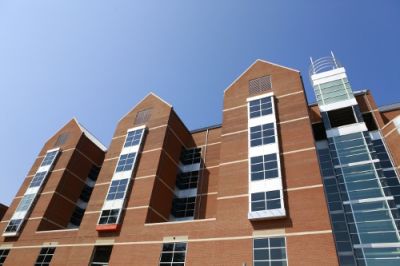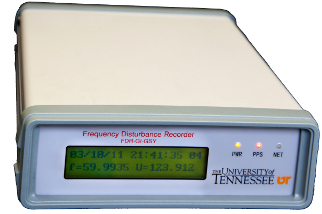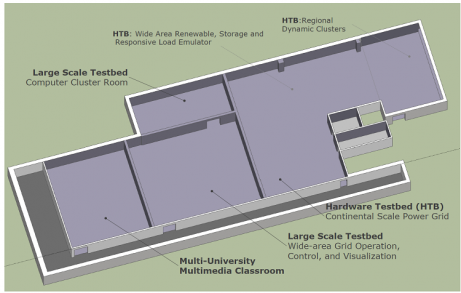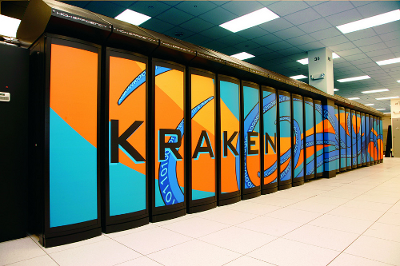University of Tennessee, Knoxville Facilities
 The College of Engineering committed 16,000 ft2 of space to the center that houses the CURENT Hardware Testbed, CURENT Large-scale System Testbed, FNET monitoring and visualization lab, as well as general power systems and power electronics lab facilities. The center's labs have dedicated high-power feeds to satisfy any special power needs. Dedicated conference rooms, equipped with state-of-the-art communications and video-conferencing technology, facilitate collaboration with the partner institutions and industry partners.
The College of Engineering committed 16,000 ft2 of space to the center that houses the CURENT Hardware Testbed, CURENT Large-scale System Testbed, FNET monitoring and visualization lab, as well as general power systems and power electronics lab facilities. The center's labs have dedicated high-power feeds to satisfy any special power needs. Dedicated conference rooms, equipped with state-of-the-art communications and video-conferencing technology, facilitate collaboration with the partner institutions and industry partners.
Demonstrating UT’s commitment to sustainability, the facility is expected to obtain the U.S. Green Building Council’s prestigious LEED (Leadership in Energy and Environmental Design) certification, becoming the first building on the main campus to do so.
Other facilities at the University of Tennessee, Knoxville include:

The Power Information Technology Laboratory has two main functions. It first serves as the data center for the FNET project, which collects high-resolution wide-area frequency data from over 80 Frequency Disturbance Recorder (FDR) sensors located throughout the U.S. power grid and around the world. The Power IT Lab is also used to develop power monitoring hardware and server software for this nationwide power frequency dynamics monitoring network. This lab also performs the design, testing, and calibration of the FDRs.
Specialized hardware includes:
- Agilent 6811B AC power source/analyzer
- Tektronix TDS304C digital phosphor oscilloscope (300 MHz, 3.5 GS/s)
- Doble F6150 power system simulator
- Doble High Precision Test kit, which is equipped with GPS satellite receiver and precise measurement systems using the timing signal provided by these satellites.
- Tektronix AFG3021B single channel arbitrary function generator
- High performance digital scopes
- HP Network Analyzer
- Power quality and harmonic measurement instruments
 The Power Systems Simulation Laboratory, located in Greve Hall, is equipped with computers and software to perform power systems research, as well as power quality and harmonic measurement instruments. The lab research software includes EMTP-RV, EMTDC, Saber, Ansoft, PSS/E, and PSLF.
The Power Systems Simulation Laboratory, located in Greve Hall, is equipped with computers and software to perform power systems research, as well as power quality and harmonic measurement instruments. The lab research software includes EMTP-RV, EMTDC, Saber, Ansoft, PSS/E, and PSLF.
The Power Electronics Laboratory is known for its high-quality research contributions in power electronic converters, control of motor drives, power quality, and silicon carbide-based power electronic systems. The laboratory is located in the Science and Engineering Research Facility and is being renovated with $1 million in equipment funding from an ONR Defense University Research Instrumentation Fund (DURIP) and UTK internal funding.
The main special equipment includes:
- 100 kW, 1000 V DC power supply
- 20 kW, 460 V single- and three-phase variable frequency AC power source
- high power curve tracer
- 20 kW electronic and RL load
- impedance analyzer and EMI tester
- temperature control and measurement system
- power analyzer
- high frequency power amplifiers
- digital oscilloscopes and probes
- magnetic winders
- DSP-based and real-time control systems (OPAL-RT)
- PM and induction machines and drives
The laboratory also has state-of-the-art software (Saber, Matlab/Simulink, PSIM, PLECS, Protel, ANSOFT, etc.) for circuit simulation, PCB design, control simulation, circuit parameter extraction, and finite element analysis for electromagnetic and thermal-mechanical performance. The laboratory also has solar panels, fuel cells, and multilevel converters for use as distributed energy sources.
 A 100,000-core Cray XT5 supercomputer, Kraken is the world’s first academic supercomputer to reach petascale capability, performing more than one quadrillion operations per second. It is currently ranked eleventh among the fastest supercomputers in the world. Funded by a $65 million grant from the National Science Foundation, the computer began operating in 2007. It is currently housed at the Oak Ridge National Laboratory. UT faculty have conducted more than 33 projects on Kraken, which is more than any other university. Kraken is a part of TeraGrid, a nationwide network of supercomputers established by the NSF to facilitate scientific research.
A 100,000-core Cray XT5 supercomputer, Kraken is the world’s first academic supercomputer to reach petascale capability, performing more than one quadrillion operations per second. It is currently ranked eleventh among the fastest supercomputers in the world. Funded by a $65 million grant from the National Science Foundation, the computer began operating in 2007. It is currently housed at the Oak Ridge National Laboratory. UT faculty have conducted more than 33 projects on Kraken, which is more than any other university. Kraken is a part of TeraGrid, a nationwide network of supercomputers established by the NSF to facilitate scientific research.

